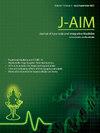Evaluation of fertility toxicity and embryo-fetal developmental toxicity profile of Ayush AG, a compound herbo-mineral Ayurvedic formulation
IF 1.9
Q3 INTEGRATIVE & COMPLEMENTARY MEDICINE
引用次数: 0
Abstract
Background
It is essential to generate the reproduction toxicity data of any drug that will be used in pregnancy or during the reproductive phase of life. Ayush AG, a compound herbo-mineral Ayurvedic formulation that is developed for promoting the health of the fetus and mother, was tested to assess its reproductive toxicity profile as per the standard guidelines.
Materials and method
In the fertility toxicity study, Ayush AG, the test drug was administered in three graded doses to Wistar rats (40 male and 40 female) during the premating, mating period, gestation, and lactation periods. Parameters such as estrous cycle, body weight, feed consumption, hematology, serum biochemistry, pup body weight, hematology and biochemistry, histopathology of reproductive organs and reproductive indices were studied. In the embryo-fetal developmental toxicity study, the test drug was administered from day 7 to day 9 of the gestation period in 18 pregnant rats and sacrificed on gestation day 20. Parameters such as body weight during gestation, uterus weight, fetus and placenta weight, gross examination of fetuses for sex, external and visceral anomalies were studied.
Results
In the fertility toxicity study, no adverse effect on mating behaviour, estrus cycle, conception rate, body weight, hematological and biochemical parameters, pup growth, or histopathology was found at dose level of 750 mg/kg of Ayush AG. No teratogenic changes were observed in the fetuses in the embryo-fetal developmental toxicity study at dose level of 750 mg/kg.
Conclusion
Ayush AG, the compound herbo-mineral Ayurvedic formulation, has been demonstrated to be safe at the dose of 750 mg/kg in fertility toxicity and embryo-fetal developmental toxicity studies in Wistar rats.
复方阿育吠陀草药-矿物质制剂Ayush AG的生育毒性和胚胎-胎儿发育毒性分析
背景在妊娠期或生殖期使用的任何药物的生殖毒性数据都是至关重要的。Ayush AG是为促进胎儿和母亲健康而开发的一种复方阿育吠陀草药矿物制剂,根据标准准则对其生殖毒性进行了测试,以评估其毒性。材料与方法在生育毒性研究中,将试验药物Ayush AG分三个分级剂量分别在Wistar大鼠(雄性和雌性各40只)的交配期、交配期、妊娠期和哺乳期给药。研究了发情周期、体重、采食量、血液学、血清生化、幼犬体重、血液学生化、生殖器官组织病理学及生殖指标等参数。在胚胎-胎儿发育毒性研究中,试验药物于18只妊娠大鼠妊娠第7天至第9天给药,妊娠第20天处死。研究了妊娠期体重、子宫重量、胎儿和胎盘重量、胎儿性别大体检查、外部和内脏异常等参数。结果在育性毒性研究中,750 mg/kg剂量水平未发现对交配行为、发情周期、受孕率、体重、血液生化指标、幼犬生长及组织病理学等方面产生不良影响。在750 mg/kg的剂量水平下,胚胎-胎儿发育毒性研究未观察到胎儿的致畸改变。结论复方阿育吠陀药(ayush AG)在750mg /kg剂量下对Wistar大鼠的生育毒性和胚胎-胎儿发育毒性研究证明是安全的。
本文章由计算机程序翻译,如有差异,请以英文原文为准。
求助全文
约1分钟内获得全文
求助全文
来源期刊

Journal of Ayurveda and Integrative Medicine
INTEGRATIVE & COMPLEMENTARY MEDICINE-
CiteScore
4.70
自引率
12.50%
发文量
136
审稿时长
30 weeks
 求助内容:
求助内容: 应助结果提醒方式:
应助结果提醒方式:


